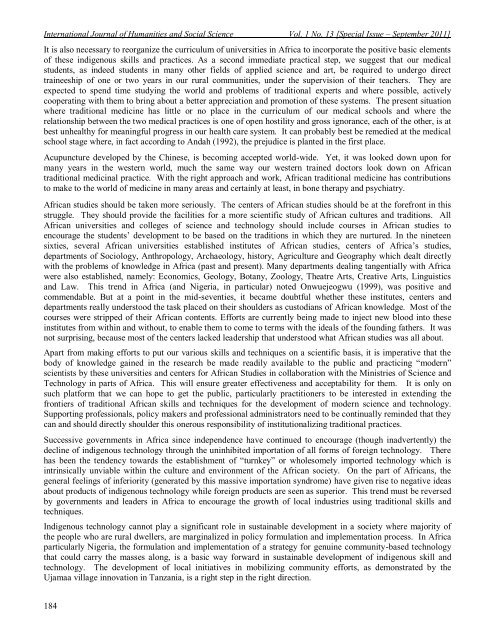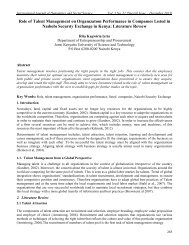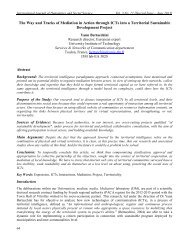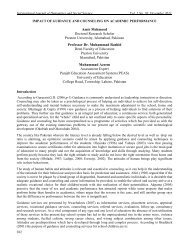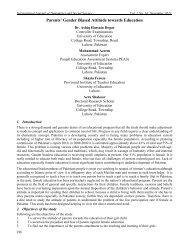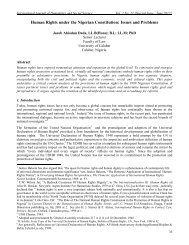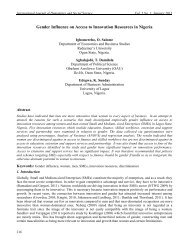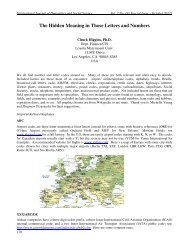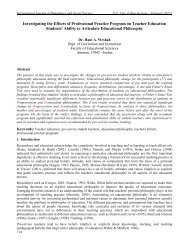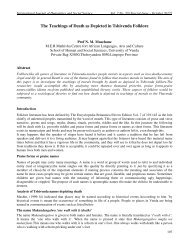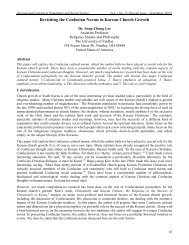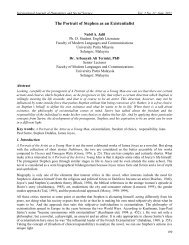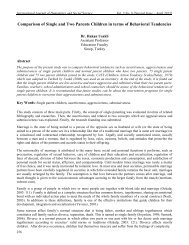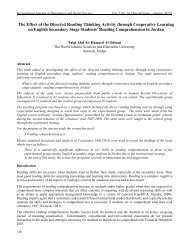THE ROLE OF TRADITIONAL SKILLS AND TECHNIQUES IN THE ...
THE ROLE OF TRADITIONAL SKILLS AND TECHNIQUES IN THE ...
THE ROLE OF TRADITIONAL SKILLS AND TECHNIQUES IN THE ...
You also want an ePaper? Increase the reach of your titles
YUMPU automatically turns print PDFs into web optimized ePapers that Google loves.
International Journal of Humanities and Social Science Vol. 1 No. 13 [Special Issue – September 2011]<br />
It is also necessary to reorganize the curriculum of universities in Africa to incorporate the positive basic elements<br />
of these indigenous skills and practices. As a second immediate practical step, we suggest that our medical<br />
students, as indeed students in many other fields of applied science and art, be required to undergo direct<br />
traineeship of one or two years in our rural communities, under the supervision of their teachers. They are<br />
expected to spend time studying the world and problems of traditional experts and where possible, actively<br />
cooperating with them to bring about a better appreciation and promotion of these systems. The present situation<br />
where traditional medicine has little or no place in the curriculum of our medical schools and where the<br />
relationship between the two medical practices is one of open hostility and gross ignorance, each of the other, is at<br />
best unhealthy for meaningful progress in our health care system. It can probably best be remedied at the medical<br />
school stage where, in fact according to Andah (1992), the prejudice is planted in the first place.<br />
Acupuncture developed by the Chinese, is becoming accepted world-wide. Yet, it was looked down upon for<br />
many years in the western world, much the same way our western trained doctors look down on African<br />
traditional medicinal practice. With the right approach and work, African traditional medicine has contributions<br />
to make to the world of medicine in many areas and certainly at least, in bone therapy and psychiatry.<br />
African studies should be taken more seriously. The centers of African studies should be at the forefront in this<br />
struggle. They should provide the facilities for a more scientific study of African cultures and traditions. All<br />
African universities and colleges of science and technology should include courses in African studies to<br />
encourage the students‟ development to be based on the traditions in which they are nurtured. In the nineteen<br />
sixties, several African universities established institutes of African studies, centers of Africa‟s studies,<br />
departments of Sociology, Anthropology, Archaeology, history, Agriculture and Geography which dealt directly<br />
with the problems of knowledge in Africa (past and present). Many departments dealing tangentially with Africa<br />
were also established, namely: Economics, Geology, Botany, Zoology, Theatre Arts, Creative Arts, Linguistics<br />
and Law. This trend in Africa (and Nigeria, in particular) noted Onwuejeogwu (1999), was positive and<br />
commendable. But at a point in the mid-seventies, it became doubtful whether these institutes, centers and<br />
departments really understood the task placed on their shoulders as custodians of African knowledge. Most of the<br />
courses were stripped of their African contents. Efforts are currently being made to inject new blood into these<br />
institutes from within and without, to enable them to come to terms with the ideals of the founding fathers. It was<br />
not surprising, because most of the centers lacked leadership that understood what African studies was all about.<br />
Apart from making efforts to put our various skills and techniques on a scientific basis, it is imperative that the<br />
body of knowledge gained in the research be made readily available to the public and practicing “modern”<br />
scientists by these universities and centers for African Studies in collaboration with the Ministries of Science and<br />
Technology in parts of Africa. This will ensure greater effectiveness and acceptability for them. It is only on<br />
such platform that we can hope to get the public, particularly practitioners to be interested in extending the<br />
frontiers of traditional African skills and techniques for the development of modern science and technology.<br />
Supporting professionals, policy makers and professional administrators need to be continually reminded that they<br />
can and should directly shoulder this onerous responsibility of institutionalizing traditional practices.<br />
Successive governments in Africa since independence have continued to encourage (though inadvertently) the<br />
decline of indigenous technology through the uninhibited importation of all forms of foreign technology. There<br />
has been the tendency towards the establishment of “turnkey” or wholesomely imported technology which is<br />
intrinsically unviable within the culture and environment of the African society. On the part of Africans, the<br />
general feelings of inferiority (generated by this massive importation syndrome) have given rise to negative ideas<br />
about products of indigenous technology while foreign products are seen as superior. This trend must be reversed<br />
by governments and leaders in Africa to encourage the growth of local industries using traditional skills and<br />
techniques.<br />
Indigenous technology cannot play a significant role in sustainable development in a society where majority of<br />
the people who are rural dwellers, are marginalized in policy formulation and implementation process. In Africa<br />
particularly Nigeria, the formulation and implementation of a strategy for genuine community-based technology<br />
that could carry the masses along, is a basic way forward in sustainable development of indigenous skill and<br />
technology. The development of local initiatives in mobilizing community efforts, as demonstrated by the<br />
Ujamaa village innovation in Tanzania, is a right step in the right direction.<br />
184


